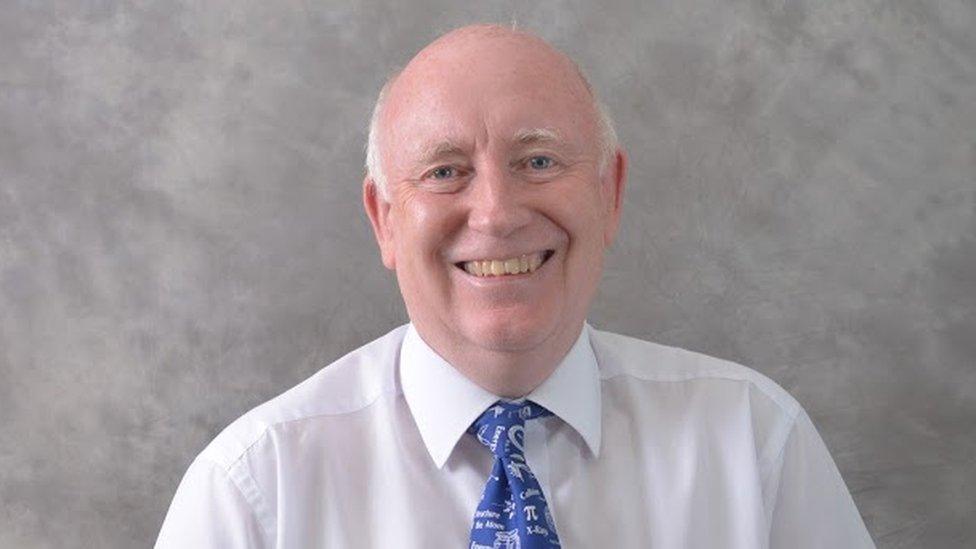Secondary teachers 'want more flexible working patterns'
- Published

Jennifer Hart: 'When I come in, I'm ready to go'
Secondary school leaders are being urged do more to accommodate teachers who want to work part-time or flexibly.
A report by the National Foundation for Educational Research says there is an "unmet demand" from secondary teachers wanting to reduce or alter their hours.
It estimates that one in six teachers would like to reduce their hours - one in 12 by more than one day a week.
The government said it was supporting schools to do more to implement flexible working.
With the number of secondary school pupils in England set to increase by 15% between 2018 and 2025, the NFER's report says attracting and retaining enough teachers is "a key challenge".
The latest data for the workforce in England indicates that 19% of secondary school teachers worked part-time in 2017, compared to 27% of primary teachers.
The report says that "a lack of part-time and flexible working opportunities is an important factor contributing to some secondary teachers leaving the profession, and is preventing others from returning".
'I'm a far better teacher'
Jennifer Hart, head of drama at Fakenham Academy in Norfolk, went down to three days a week after the birth of her first child seven years ago.
Mrs Hart says if she hadn't been able to go part-time, she would probably have left the profession she loves.
"I certainly wouldn't be a very good teacher now."
She says her pupils get the best of her when she's in school, because she's not there on the other days.
"My dedication to my students is strong, but working part-time enables me to manage the pull of my own children at home and the children at school.
"When I come in, I'm ready to go. When I'm in school, I'm never off, I'm always there."

Andy Williams says part-time work enables him to stay in the profession
Andy Williams, 63, has also gone part-time at Fakenham Academy and is one of only two teachers there who can take A-level chemistry classes.
He says this move means the school retains the expertise of older teachers, particularly in subjects where there is a shortage of teachers.
"It's enabled me to carry on teaching, which I really love, and working with the kids, but it has also enabled me to do more with the family, other paid work and other activities."
Emma Kell, a senior leadership team member at a comprehensive school in north London, found that going part-time for the past 10 of her 21 years service gave her time to pursue other interests - in her case, writing a book.

Emma Kell: 'I've got energy'
"I'm a far better teacher for being a whole human being, I've got energy, I've got anecdotes, I'm modelling something else.
"When I published my book, my students were so excited for me and several have said 'I'd like to publish a book like you' - so you're modelling the range of opportunities."
What concerns do schools have with these requests?
The NFER report highlights four main concerns faced by school leaders when a member of staff asks to work part-time or flexibly:
ensuring continuity for pupils and timetabling different working patterns
constraints on other forms of flexible working
communication issues - with other members of staff as well as parents
additional costs.
But Lucy Rose, co-founder of Flexible Teacher Talent, which supports teachers and schools with flexible working requests, says the benefits far outweigh the disadvantages.
"Head teachers can be understandably cautious but [...] where schools have done this [offered flexibility], far from being an inconvenience, all staff have benefited.
"The school spends little or nothing on supply/cover, the head teacher receives fewer requests for in-term absences and general absence sick days decrease.

Holly Power says flexible working helps retain teachers
"Staff retention is higher, the school spends less on recruitment, pools for interview are wider and so on."
Holly Power, chief executive officer of Return to Teach, and part-time assistant principal at Chelsea Academy in London, adds: "If flexible working has meant an experienced teacher is retained, other members of staff (such as new teachers) will benefit from this experience.
"It can also provide a development opportunity for other members of staff to step up to cover the flexible person when they aren't on site."
What has the response been?
Geoff Barton, general secretary of the Association of School and College Leaders, says senior leadership must "rise to the challenge".
"We simply must stem the exodus of teachers from the profession, and one way we can do that is to improve opportunities for part-time and flexible working.
"It won't solve the crisis on its own, but it will help, and we welcome the positive and supportive contribution of this report.
"People increasingly expect employers to adapt to changes in their lives, and we must rise to that challenge."
The Department for Education said it was supporting schools to do more to implement flexible working "while encouraging all head teachers to make a firm commitment to start embedding a culture of flexible working in their schools".